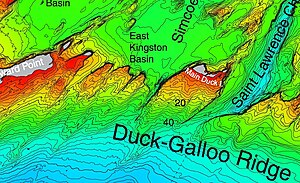Timber Island (Lake Ontario): Difference between revisions
George Swan (talk | contribs) (trim metadata incompatible with this site) |
George Swan (talk | contribs) (trim metadata incompatible with this site) |
||
| Line 1: | Line 1: | ||
[[File:NOAA map of Duck Galloo Ridge (cropped) showing Timber, Swetman, Main Duck and Yorkshire islands, and some subsurface shoals.jpg | thumb | Timber Island is the westernmost island in this chain.]] | [[File:NOAA map of Duck Galloo Ridge (cropped) showing Timber, Swetman, Main Duck and Yorkshire islands, and some subsurface shoals.jpg | thumb | Timber Island is the westernmost island in this chain.]] | ||
'''Timber Island''' is a | '''Timber Island''' is a 44 hectare island in the east end of [[Lake Ontario]], off [[Prince Edward County, Ontario|Prince Edward County]], [[Canada]].<ref name=LoorMainDuck/><ref name=thewhig2016-06-21/><ref name=Protected1985-09-27/> It is part of a chain of islands and shoals, including [[Stoney Island]], [[Galloo Island]], [[Main Duck Island]], [[Yorkshire Island]] and [[Swetman Island]].<ref name=PictonGazette2009-04-02/> Timber Island and Swetman Island, and their nearby shoals, are known as the [[False Duck Islands]]. | ||
The island used to be home to [[bald eagle]]s.<ref name=Protected1985-09-27/><ref name=PictonGazette2009-04-02/> | The island used to be home to [[bald eagle]]s.<ref name=Protected1985-09-27/><ref name=PictonGazette2009-04-02/> | ||
Revision as of 14:29, 18 December 2023
Timber Island is a 44 hectare island in the east end of Lake Ontario, off Prince Edward County, Canada.[1][2][3] It is part of a chain of islands and shoals, including Stoney Island, Galloo Island, Main Duck Island, Yorkshire Island and Swetman Island.[4] Timber Island and Swetman Island, and their nearby shoals, are known as the False Duck Islands.
The island used to be home to bald eagles.[3][4]
The island was donated to the province by its owner, Barbara Cody, in 1962.[3]
The island is currently part of the Sandbanks Provincial Park, visitors are allowed, after getting the permission of the park superintendent.[5] Most of the island is covered by an oak-hickory forest. Plants rare to eastern Ontario are found on the island. The island provides a resting spot for birds on their annual migration.
References
- ↑ Robert B. Townsend. Main Duck Island History. Retrieved on 2019-04-01. “A quarter of a mile off its shore is a little duckling called Yorkshire Island. Farther west, and nearer Point Traverse, are the False Ducks, Template:Sic False Duck, Timber, the Duckling islands, and a wicked layout of duck eggs in the form of reefs and boulders.”
- ↑ Susanna MacLeod. Island has unique heritage, Kingston Whig-Standard, 2016-06-21. Retrieved on 2019-04-01. “Surrounded by shallow waters with hull-piercing shoals and enormous, boat-grinding, rocky protrusions, Main Duck Island and the nearby smaller Yorkshire Island are part of a chain of islands in eastern Lake Ontario. The Ducks, said the Syracuse Herald in 1931, 'have been the scene of many wrecks and have caused the loss of more than a score of lives.'”
- ↑ 3.0 3.1 3.2 J.R. Ottway. Timber Island Provincial Nature Reserve: Interim Management Statement, 1985-09-25. Retrieved on 2019-04-02. “Timber Island was placed into regulation as a nature reserve class provincial park on January 24, 1985.”
- ↑ 4.0 4.1 Terry Spraque. Our Natural Heritage: County is Island of Islands, Picton Gazette, 2009-04-02. Retrieved on 2019-04-01. “From the air, Main Duck Island is part of a chain of islands, stretching from Stoney and the Galloo Islands on the American side, to Main Duck and its neighbour Yorkshire Island, and closer to the County, the False Ducks, encompassing Swetman and Timber Islands. Timber Island was the last stronghold in Ontario of the majestic Bald Eagle, before it declined in the late 1940s.”
- ↑ Timber Island. Retrieved on 2019-04-02.
